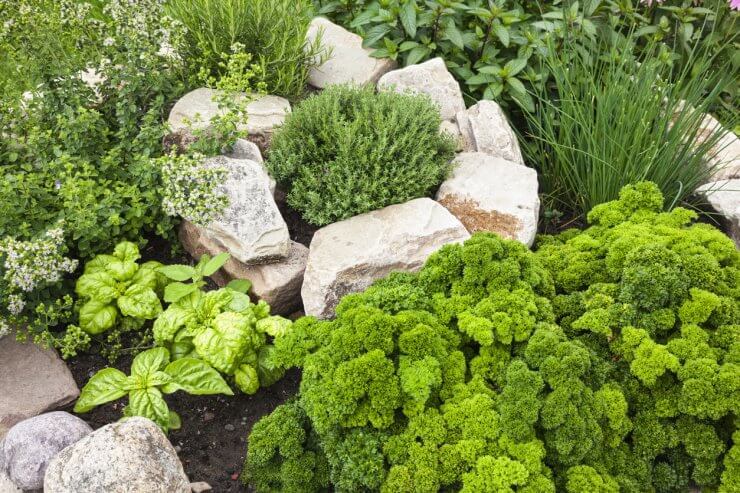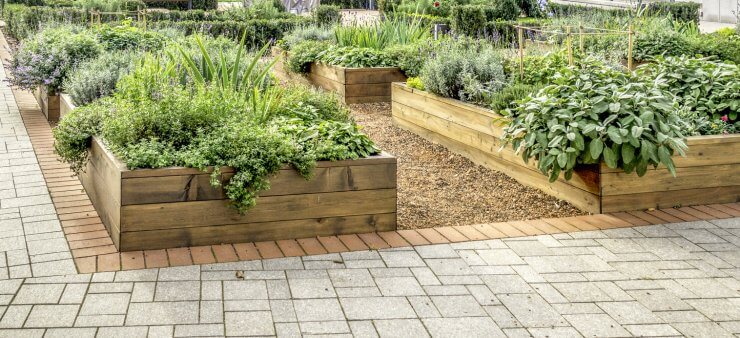
Stone vs. mulch. It’s the final piece of the garden design puzzle. After we’ve decided what to plant in the garden, what kind of support trellises we want to make or buy, and what kind of watering system we’re using next season, there’s still the question of what kind of edging is best for an edible garden.
I say edible garden because there’s a very different aesthetic between a flower garden and a vegetable garden. Certainly, you can use flowers as a border in your edible garden. Some herbs produce stunning and unique flowers; dill is one of my favorites. And there are edible flowers. However, the general idea behind an edible garden is to plant things where they will grow best rather than how they will look. As such, you may have more options for an edible garden.
That’s also not to say that a food garden can’t be beautiful. On the contrary, I find them to be quite attractive as a landscape element. But I digress, and you get the point. Stone vs. mulch is about more than just aesthetics when it comes to your vegetable garden. So which one is better?
Discover 7 top tips for growing, harvesting, and enjoying tomatoes from your home garden—when you access the FREE guide The Best Way to Grow Tomatoes, right now!

Stone vs. mulch: The shocking truth about your garden’s edge
The “shocking truth” here is that the stone vs. mulch debate is really about what works best for your particular garden. Both materials have their advantages. Let’s take a look at stone.
One of the biggest advantages of stone is that it will last forever. It’s not going to break down or need replacement in any of our lifetimes. Stone also comes in a variety of shapes, sizes, colors, and types. You can find shaped concrete edging or stones with natural edges. They may be square, rectangular, or unevenly shaped. If you have an idea, there is likely a garden edging stone to help you make that idea a reality.
Stone is also great for weed prevention, and you don’t need to reconfigure your garden borders each year. Additionally, you can opt for a variety of sizes.
Of course, stone can also be expensive and hard to work with, especially if you go with larger and heavier stones. They also retain heat, which may be good in cooler weather, but they can also dramatically increase the soil temperature in summer. Stone also fails to provide any benefit to the plants themselves, since they don’t release nutrients or improve soil health.
Mulch, on the other hand, gradually breaks down and adds nutrients to the soil. It is light in weight and easy to work with, and if you have your own compost bin, mulch can be free. For that matter, even if you buy it, there’s no contest between stone vs. mulch: stone is way more expensive.
Mulch may not offer you the extensive decorative options that stone does, but you do have some choices. Straw, compost, and wood chips all make great mulch. These materials also retain moisture, which contributes to that moist but well-drained soil that so many vegetables love. Like stone, mulch can also help prevent weeds.
So what’s the downside? Unlike stone, you’ll most likely need to replace your mulch each year. Possibly even within the season if there is a strong storm that carries it away. This also brings up the fact that over time, the cost of stone vs. mulch equals out. In fact, if you’re buying mulch year after year, it could eventually be more expensive than stone. Again, though, if you make your own compost, you have a source of free mulch.
Who said you could only have one?
Personally, I like the defined edges you can get with stone and the soil and plant benefits that come from mulch. You can certainly use stone around the edges and fill in the garden itself with mulch.
Ultimately, though, the choice is yours. If you think you may expand or change the layout of your garden, mulch may be a better option. If you can’t imagine changing your garden design and want your edges set in stone (ha!), go for stone.
Do you prefer stone or mulch for your garden edging? I’d love to read your thoughts in the comments.
Discover 7 top tips for growing, harvesting, and enjoying tomatoes from your home garden—when you access the FREE guide The Best Way to Grow Tomatoes, right now!





I like the idea of using both. Stone will give a nice esthetic look and the mulch will help enrich the soil – a win-win result.